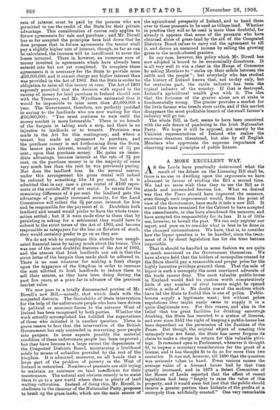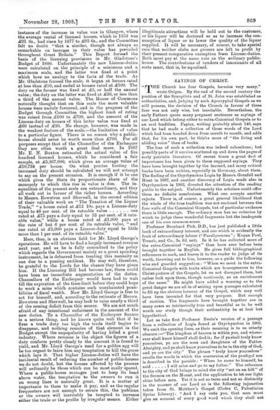A MORE EXCELLENT WAY.
AS the Lords have practically determined what the result of the debate on the Licensing Bill shall be, there is no use in dwelling upon the arguments we have advanced in favour of reading the Bill a second time. We had no more wish than they to see the Bill as it stands and unamended become law. What we desired was that the Peers should have improved the measure, even though such improvement would, from the point of view of the Government, have made it into a new Bill. It would then have remained for the Cabinet to have accepted the amendments, or else have abandoned the measure, and have accepted the responsibility for its loss. It is of little use, however, to bewail the past. We can only register our regret, and pass on to consider what is best to be done in the changed circumstances. We have, that is, to consider how the liquor question is to be handled, since the treat- ment of it by direct legislation has for the time become impossible.
That it should be handled in some fashion we are quite as much convinced as the Government themselves. We have always held that the holders of monopolies created by the State should pay a reasonable and proper price for the highly lucrative privilege granted. them. That the sale of liquor is such a monopoly the most convinced advocate of the trade cannot deny. The most valuable public-house in England would find its custom worth comparatively little if any number of rival taverns might be opened within a mile of it. No doubt one of the motives which have led the State to forbid this is one of police. Public- houses supply a legitimate want; but without police regulations they might easily c•me to supply it in a quite illegitimate way. For this reason, and also in the belief that too great facilities for drinking encourage drinking, the State has resorted to a system of licenses, and ever since 1552 the right of keeping a public-house has been dependent on the permission of the Justices of the Peace. But though the original object of creating this monopoly was not fiscal, the State has never forgone its claim to make a charge in return for this valuable privi- lege. It remained open to Parliament, whenever it thought fit, to impose a monetary consideration for the grant of a license, and it has thought fit to do so for more than two centuries. It was not, however, till 1880 that the question was seriously taken in hand. From various causes the average value of a licensed house had by that time greatly increased, and in 1879 a Select Committee of the House of Lords reported that the effect of recent legislation had been "largely to raise the value of this property, and it would seem but just that the public should. receive a greater portion than hitherto of the profits of 'a monopoly thus artificially created." One very remarkable instance of the increase in value was in Glasgow, where the average rental of licensed houses, which in 1853 was £31. 6s., bad risen by 1877 to £93 6s., and the Committee felt no doubt "that a similar, though not always so remarkable an increase in their value has prevailed throughout Great Britain." This Report formed the basis of the licensing provisions in Mr. Gladstone's Budget of 1880. Unfortunately the new License-duties were calculated on the principle of a minimum and a maximum scale, and the latter was fixed at a point which bore no analogy to the facts of the trade. As Mr. Gladstone framed the scale, it began at houses rated at less than £10, and ended at houses rated at £100. The duty ou the former was fixed at £5, or half the annual value ; the duty on the latter was fixed at £30, or less than a third of the annual value. The House of Commons naturally thought that on this scale the more valuable houses were unduly favoured, and in the progress of the Budget through Committee the highest limit of rating was raised from £100 to £700, and the amount of the License-duty on houses of this latter value was fixed at 460 instead of £30. No change, however, was made in the weakest feature of the scale,—the limitation of value to a particular figure. There is no reason why a public- house should never be worth more than £700. For all purposes except that of the Chancellor of the Exchequer they are often worth a great deal more. In 1897 Mr. E. N. Buxton estimated the actual value of five hundred licensed houses, which he considered a fair sample, at £5,367,000, which gives an average value of £10,734 per house. On what precise footing the increased duty should be calculated we will not attempt to say on the present occasion. It is enough if it be one which gives the State its proportionate share of the monopoly to which this rise in value is due. The in- equalities of, the present scale are extraordinary, and they all work out in favour of the richer houses. According to Messrs. Rowntree and Sherwell, in the second edition of their valuable work on " The Taxation of the Liquor Trade," " a house rated at £12 10s. pays a License-duty equal to 48 per cent. of its rateable value one rated at £75 pays a duty equal to 33 per cent. of it rate- able value," while a house rated at £1,000 pays at the rate of but 6 per cent. of its rateable value, " and one rated at £5,000 pays a License-duty equal to little more than 1 per cent. of its rateable value."
Here, then, is an obvious field for Mr. Lloyd George's operations. Ho will have to find a largely increased revenue next year, and as he is fully committed to the policy which regards the Government maiuly as a great spending instrument, he is debarred from treating this necessity as one due to a passing accident. He may well, therefore, be grateful to the Lords for the chance they have, given him. If the Licensing Bill had become law, there could have been no immediate augmentation of the duties. Chancellors of the Exchequer would have had to wait till the expiration of the time-limit before they could hope to work a mine which contains such unexhausted possi- bilities of fiscal wealth. Now Mr. Lloyd George is free to act for himself, and, according to the estimate of Messrs. Rowntree and Sherwell, he may look to raise nearly a third of the coming deficit from this source. We are not much afraid of any intentional unfairness in the amount of the new duties. To a Chancellor of the Exchequer finance is a serious thing, and he knows quite well that if he fixes a trade duty too high the trade itself begins to disappear, and nothing remains of that element in the Budget except the unpopularity of having killed a great industry. Where revenue is the object the figures of a duty conform pretty closely to the amount it is found to yield, and Mr. Lloyd George's need for a golden egg will be too urgent to leave him any temptation to kill the goose which lays it. That higher License-duties will have the incidental result of reducing the number of public-houses we do not doubt, but the houses affected by the process will ordinarily be those which can be most easily spared. Where a public-house manages just to keep its head above water, the temptation to the owners to run it on wrong lines is naturally great. It is a matter of importance to them to make it pay, and as the regular frequenters are not enough to secure this, the publican or the owners will inevitably be tempted to increase either the trade or the profits by irregular means. Either illegitimate attractions will be held out to the customer, or his liquor will be doctored so as to increase the con- sumptiou of liquor or to lower the quality of the liquor supplied. It will be necessary, of course, to take special care that neither clubs nor grocers are left to profit by their-present comparative exemption from License-duties. Both must pay at the same rate as the ordinary public- house. The contributions of vendors of intoxicants of all sorts must, that is, be equalised.



















































 Previous page
Previous page